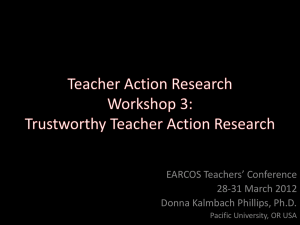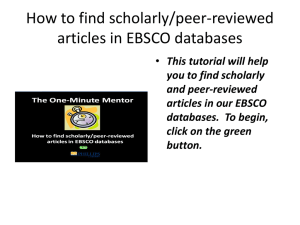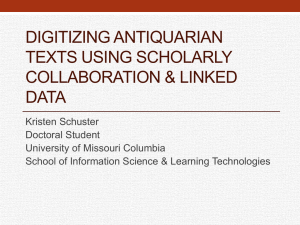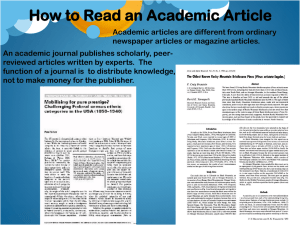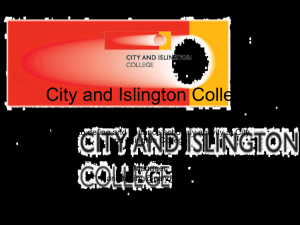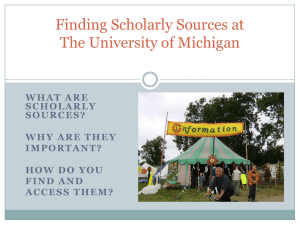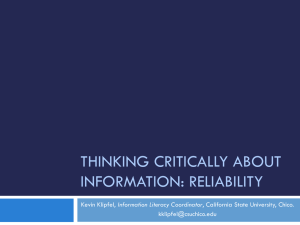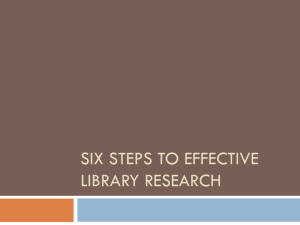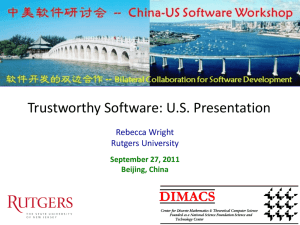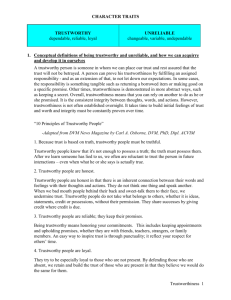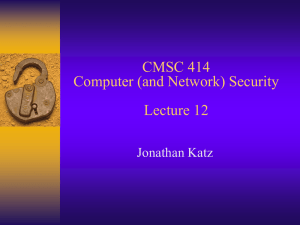Finding Trustworthy Internet Sources
advertisement
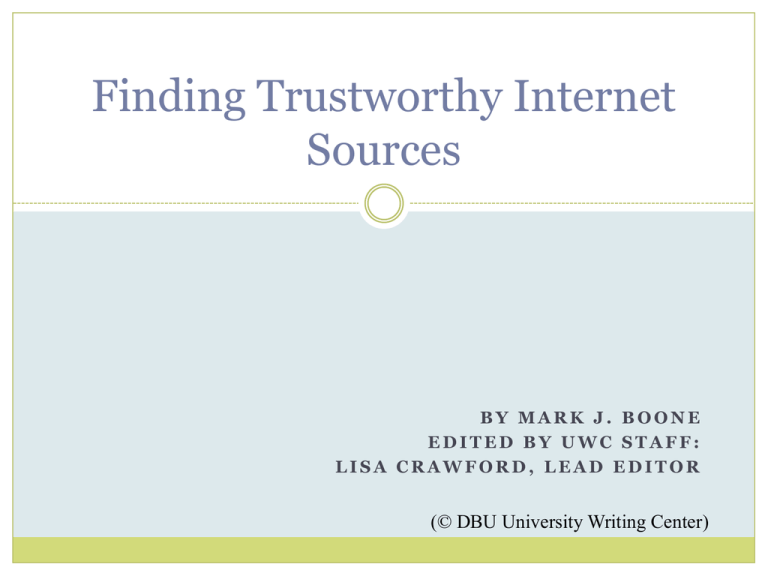
Finding Trustworthy Internet Sources BY MARK J. BOONE EDITED BY UWC STAFF: LISA CRAWFORD, LEAD EDITOR (© DBU University Writing Center) Contents No Substitute for Traditional Research…………………………………..............slides 3-4 Trustworthy Domains: .edu, .gov, etc……………………………………………….........slides 5-8 .com Extensions…………………………………….slides 9-11 Scholarly Databases……………….................slides 12-13 It’s All about the Source……………………………..slide 14 The First Thing to Know The first thing one should know is that internet sources are no substitute for both reading and quoting good books. The same applies to good magazines and scholarly journals. Do not fail to use these sources in the research process. Internet sources should enhance, not replace, traditional research methods. The Problem The internet is a place where one can find just about all the information in the world in a couple of seconds. The advantage of this is that good information for research papers is just mouse-clicks away. The disadvantage is that bad information is just as close. This workshop will help in finding the right internet sources for research papers . Trustworthy Top-Level Domain Names The extension of the website can be very useful towards finding trustworthy sources, extension meaning the indicator of the website’s association, such as .com: www.thisisawebsite.com. For instance, .gov stands for “government agency.” Because they are associated with the government, “.gov” websites are usually trustworthy. .edu Extensions: Trustworthy One of the best top-level domains for research is likely to be the .edu extension. Any site from a .edu domain is connected in some way to a university establishment. It may state or be… the university’s official stance on something statistics simply conveyed through the university website a university English department’s summary of the Enlightenment a professor’s site with resources useful to students in her class the findings of the scientific studies of a research university Any and all of these situations involve information which has the university’s seal of approval on it because of the .edu extension. It is safe to say that such sites generally carry the authority of that university. Few internet sources could be more trustworthy than these! .org Extensions: Often Trustworthy Sites with the .org domain are for organizations. Sites with .org domains are often more trustworthy than .com sites, though the level of trustworthiness varies from organization to organization. Also, an organization’s relevance to the project will also vary. For instance… A charitable organization that works in the Sudan may be a good source for research on humanitarian crises of our day. An organization that exists specifically to collect statistics on American religion (like www.barna.org) would typically be a trustworthy source when one needs to write a religion paper. .org Extensions . . . On the other hand… www.moveon.org is run by an organization that, during the 2004 presidential election, was dedicated to keeping George W. Bush from being re-elected. Anything moveon.org says about politics would be considered biased information. One might want to quote from it for its point of view, and then also present www.gop.org’s stance on the issue being researched. Writers have to learn how to distinguish between .org sites that provide accurate information for projects and ones that do not. .com Extensions: Sometimes Trustworthy The .com extension stands for “commercial.” The .com extension is a catch-all category that includes all sorts of things. Do not use just any .com for research papers. Some .com’s are run by very respectable, intelligent people. Others are pure frivolity or lies. .com sites vary both in accuracy and relevance. Websites with the .com extension are like most internet sources: researchers need to evaluate each website to determine if it is trustworthy and appropriate to their research projects. .com Extensions . . . Foxnews.com and cnn.com are sources which convey accurate information through a minimum of bias. Rushlimbaugh.com and michaelmoore.com may present some accurate information, but are probably heavily filtered through bias. Microsoft.com is a worthless source for a paper on dentistry. If a paper is about the management styles of software corporations, microsoft.com may be more appropriate. .com Extensions . . . Some websites, such as wikipedia.com or sparknotes.com, have a wealth of information and may be useful in the early stages of research for familiarizing oneself with a topic. Wikipedia.com, sparknotes.com, and other such websites are not scholarly sources. They are merely resources for getting started. Therefore, they should not be quoted as an authority on topics in papers. Always use scholarly databases! Dallas Baptist University has a wealth of knowledge accessible to its students through its library (www.dbu.edu/library). A scholarly journal contains scholarly information in a given field of study, intended for professionals and students. The collection of databases containing information from articles in scholarly journals is probably the single best online resource for research papers. Use Scholarly Databases . . . For example . . . Ebsco’s Academic Search Premier search and InfoTrac’s Expanded Academic ASAP search are very useful for all sorts of research projects. Archives of the Dallas Morning News are available through DBU’s database subscriptions. Gale’s Literary Index will help with the research papers for English classes. Ebsco’s Religion and Philosophy collection will help in religion classes. These are only a handful of examples. Writing a major research paper without the aid of scholarly journals from the online databases would be, to say the least, a bad idea. The Bottom Line The bottom line is that it is all about the source. Learn how to use trustworthy sources and not use untrustworthy sources. Also, learn how to use the source for what it is. Both of these strategies presuppose that writers are already learning to find out what a site is in the first place. There needs to be a process of continually learning how to do this.

